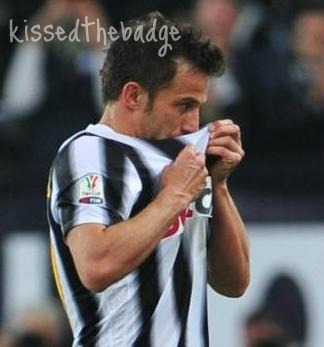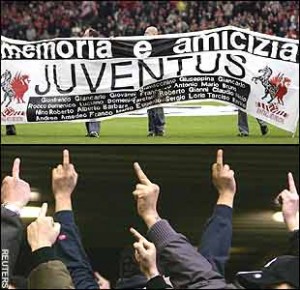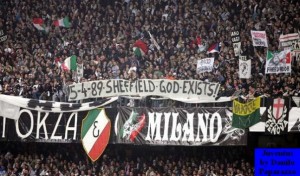Did Del Piero really turn down Liverpool because of Heysel?
 Earlier this week, Alessandro Del Piero was strongly linked with a move to Liverpool, only for him to opt for Sydney FC instead. Liverpool are in desperate need of a striker after selling Dirk Kuyt and Craig Bellamy, as well as loaning out Andy Carroll to West Ham. Brendan Rodgers even refused to rule out a move for Michael Owen who is a hate figure on Merseyside after joining hated rivals Manchester United and lifting their 19th title with them.
Earlier this week, Alessandro Del Piero was strongly linked with a move to Liverpool, only for him to opt for Sydney FC instead. Liverpool are in desperate need of a striker after selling Dirk Kuyt and Craig Bellamy, as well as loaning out Andy Carroll to West Ham. Brendan Rodgers even refused to rule out a move for Michael Owen who is a hate figure on Merseyside after joining hated rivals Manchester United and lifting their 19th title with them.
After enduring their worst start to the league in 50 years, signing a legend like Alessandro Del Piero certainly would have turned a few frowns upside down at Anfield, despite him now being in the twilight of his career, but it wasn’t to be.
Whilst it’s probable that Sydney have made it worth Del Piero’s while financially, with his contract being worth a reported £1.3m a season, his former agent, Claudio Pasqualin, believes the Heysel Disaster is what kept the Italian away from Merseyside.
“I think as a real Juventino, out of respect and remembrance for the massacre at Heysel, he said no to Liverpool,” Pasqualin told TMW.
In May 1985, ahead of the European Cup final between Juventus and Liverpool, 39 football fans were killed after Liverpool fans charged at them, causing a wall to collapse.
Red and White Kop once collected testimonies of fans who were at Heysel that day, with them reflecting on their memories of what happened.
“The only thing separating us from the Juventus fans was a thin strip of what could only be described as wire netting,” one said. “The fans got restless, partly through the heat, partly through boredom and partly because they were fed up of being sitting ducks for the fireworks raining down on them. Then the abuse started. The Juventus fans behind the chicken wire chanting, the Liverpool fans responding. the Belgian police with riot gear and clubs ran away from the fans. Yes they actually ran away from the Liverpool fans! What sort of policing is that? You charge the fans with your riot shields, helmets, visors and clubs and then you leg it when the fans turn on you? So what happens then? What happened when a bunch of fans push forward and the police run away? Well it is not bloody rocket science! What happens is the fans keep pushing forward. And what happens when thousands of fans push forward and the only thing separating them from the Juventus fans is chicken wire? Well obviously the chicken wire falls down. And what happens then is that the Juve fans run, the wall falls, people die.”
“I remember being angry that the police were allowing firework attacks over the flimsy separating fence,” said another. “When Liverpool fans charged I remember saying to my mate ‘Well they’ll get what they deserve’. Little did anyone know that the wall was about to collapse.”
Two years ago, Del Piero spoke at length about his memories of the disaster too, from his perspective as a young lad in a Juve supporting family.
29th of May 1985, I was only eleven, but I remember it all really well. My team has to win the Champions Cup. This time it just can’t get out of our hands, we are stronger than before. The day after I had to go to school, but I knew that my parents would have let me stay up late, in any case there was no way I could have fallen asleep. Mine was a Juventus family: Daddy, Mummy, my brother. I already played that game in the afternoon with my ball, and then in the evening, before go to sleep I played it again in my mind, as usual in my imagination , trying to be every single player. The fantasy makes you fly, but some years later I was to find out that the reality sometimes can be even better.
It was one of those games that everyone talked about, especially in Veneto… Veneto is crowded with Juventus fans. But the match Juventus-Liverpool, Champions Cup final 1984-85 at Heysel stadium in Brussels, we watched together with an Inter supporter: he was my father’s good friend and colleague and we invited him for dinner. Nice chance to stay together, to celebrate, at your friend’s and surely not at your opponent’s house.
The time before the beginning of that match symbolizes for me all the best of football and the passion for my team. All the worst and the most dramatic that you can only imagine came with what had happened later.
I remember that I gobbled down my dinner to have a permission to run outside to play with my parents’ friends’ son before the kick off. I remember that we were waiting, but the match didn’t start, adults were at the table, glued to the television, I heard from a distance the voice of Bruno Pizzul, that was reporting what was happening there. I was playing outside. Only later they explained to me what it was all about and I started grasping the real meaning of insanity, madness, bestial acts but also the human irresponsibility. We came back home between the first and second half. The game started, but it didn’t really matter anymore.
That was some game. We won the Cup, yes we did. But there were 39 people dead at Heysel and 32 out of 39 were Italians, Juventus supporters who wanted to celebrate as much as we did. People like us, they were us.
I’m the Juventus captain now. 25 years passed and since I was 17, I have swapped sides. From supporter, to protagonist. Today we’d like to remember the victims of that tragedy. And I will do so, not only as a player, but also as a supporter that I was, as a 11 year old child I was, who had dreamt to play that final match.
We mustn’t forget. And specially us, who are lucky to wear this jersey – doesn’t matter if for a minute or for the life time career – have to think about the match, that never started and about those who lost their lives for that match, for the passion, for the Juventus.
What made the events of Heysel even more painful for Juventus fans was the fact Liverpool refused to accept responsibility for what occurred. Whilst there is no doubt the stadium was in no fit condition to host a game of this magnitude, and ultimately was a cause of the deaths, the official denial from the club chairman, John Smith, meant there was no peace for the family members of those that died.
“Some lads had newspapers, they did not make nice reading,” said one account from a fan on RAWK. “Painted as the scum of the earth by everybody who had anything to say, there was no real understanding of what had gone on, I don’t think there is to this day. John Smith had told reporters that he believed the trouble to be the fault of ‘Chelsea fans’ – it was nonsense, clutching at straws. There had been fans of other clubs there, there always is in major cup finals, but not in any significant numbers.”
Tony Evans at The Times, a Liverpool supporter who was also at Heysel, touched on the denial more recently in his article “Our Day Of Shame”.
[Many Everton fans] feel that in some way they are the real victims of that dreadful day because their title-winning team could not play in the European Cup the next season. It taunted Liverpool supporters, some of whom still feel that they had nothing to do with the deaths of 39 people on that May night nearly 20 years ago. “A wall collapsed, that was all.” I have said it and heard it countless times. Except it is a lie.
Evans claimed that many Liverpool fans were still angry after attacks by Roma fans when they played in a victorious European Cup final the year before.
After the game, Rome erupted in rage, and the bloody events around the Olympic Stadium left everyone who was there — and those who had only heard talk of what happened — determined not to suffer again at the hands of Italian ultras. “The Italians won’t do that to us again,” was a refrain repeated in the weeks since the semi-final. It was not a matter of revenge. It was a wariness, a fear that built itself up to an enormous rage that would spill out at the slightest perceived provocation. The anger was palpable.
In conclusion, again discussing Liverpool’s attempt to relieve themselves of any blame, Evans concedes that they were at fault.
We limped home, quickly throwing off any shame, repeating the mantra that it was a construction problem, just a wall collapsing, hiding from the scale of what had happened. The disaster has a long causal chain — stabbings and beatings in Rome, hair-trigger tempers, aggression on both sides, excessive drinking, poor policing and a stadium ripe for disaster. Remove any one link and the game may have passed off peacefully. But it didn’t. So, Evertonians sing, with pathetic self-pity, “Thirty-nine Italians can’t be wrong.” Well they weren’t. We were. I was.
All English clubs were banned from European competition indefinitely as a result of this, with 20 clubs missing out on competing in competitions they had qualified for. Arsenal, Chelsea, Tottenham Hotspur, Manchester United, Everton, Southampton and Nottingham Forest were amongst the clubs that were punished for the actions of Liverpool fans at Heysel. The ban was lifted for the 1990-1991 season, ending the punishment, but not erasing a defining moment in English football history.
 Twenty years after Heysel, the two clubs met in the Champions League and Liverpool FC were ready to accept responsibility and apologise for what their fans had done. The Liverpool Echo printed the names of the people who were killed on the front cover under the title “We’re Sorry”. Ahead of kick-off Liverpool fans presented Juve with a “friendship” banner, which also listed the names. A “significant number” of Juventus fans choose to turn their backs on this gesture, raising their middle fingers, presumably believing this gesture had come twenty years too late.
Twenty years after Heysel, the two clubs met in the Champions League and Liverpool FC were ready to accept responsibility and apologise for what their fans had done. The Liverpool Echo printed the names of the people who were killed on the front cover under the title “We’re Sorry”. Ahead of kick-off Liverpool fans presented Juve with a “friendship” banner, which also listed the names. A “significant number” of Juventus fans choose to turn their backs on this gesture, raising their middle fingers, presumably believing this gesture had come twenty years too late.
The Gazzetta dello Sport reported that “it was an embrace that died against a wall of indifference.”
Paul Kelso, The Guardian, wrote: It was a gesture intended to express regret and sorrow but it was met with a devastatingly eloquent response. As the banner moved forward, watched from the centre circle by Phil Neal, Michel Platini and Ian Rush, all of whom had played at Heysel, the front 10 rows simply turned their backs. They did so again moments later when Anfield stood for a minute’s silence and supporters on the Kop displayed a mosaic repeating the sentiment, Amicizia.
When the away leg was played, with more than just 2,600 Juve fans that were present at Anfield in the stadium, feelings of friendship and reconciliation were not on the agenda.
Glenn Moore, The Independent, wrote: Forgive and forget? Many in Turin can never forgive and few will ever forget. Imagine yourself in their shoes, burying a father or son, a brother or lover, and it is easy to understand the enduring bitterness both of those who suffered a personal loss at Heysel and of the wider Juventus community. Irrational though it may be to hate, and hold responsible, every Liverpudlian, every Englishman, it is equally understandable. Who among us, in all honesty, can say they would feel otherwise?
 That was the backdrop to the uneasy mood which pervaded this stadium last night. Twenty years may have passed since Heysel but for some it could have been yesterday. The angry response of the few to the belated hand of friendship offered by Liverpool at Anfield last week presaged a more venomous reaction in Turin.
That was the backdrop to the uneasy mood which pervaded this stadium last night. Twenty years may have passed since Heysel but for some it could have been yesterday. The angry response of the few to the belated hand of friendship offered by Liverpool at Anfield last week presaged a more venomous reaction in Turin.
The lone banner in the Liverpool section featuring both club crests and the word “friendship” seemed meaningless. Another, which carried the legend “Do you think we would leave you dying?”, though a reference to the dead of Hillsborough not Heysel, appeared grotesquely insensitive. So was the rush to taunt the defeated Juventus supporters at the final whistle.
So, taking on board the feelings still held by Juve fans, when Del Piero learned about interest from Liverpool, what was he to do? He joined his boyhood club when he was 19-years-old, he played in their first team for 19 seasons, he was their captain, he is their all time highest goalscorer and he loves the club. Could he have signed for a team that large sections of his fans hated?
Harry Kewell, who joined Leeds’ youth team as a teenager, made the unforgivable decision of joining Galatasaray in 2008. He had played in Istanbul eight years earlier when two Leeds fans were stabbed and killed by Galatasaray fans yet didn’t think it was inappropriate for him to sign for the Turkish side.
“I chose the No 19 shirt when I signed for Galatasaray AS as a sign of respect for Leeds because that was the number I got when I first became a regular member of the Leeds United starting XI,” he said in his feeble attempt to make peace with the furious Leeds fans. “I felt that it might be a way to demonstrate that I had not forgotten where it all started and I was hoping that in a small way it would help the healing process of the tragedy that occurred on 5 April 2000.”
Clearly Del Piero is no Harry Kewell and was not prepared to tarnish his reputation at Juventus, even if it did mean getting to play for one of Europe’s historically biggest clubs.
“The driving force in my career has always been a deep love for football, for the Juventus colours and for its fans,” he said after signing his last contract extension with the club. He is a badge-kissing Bianconeri legend and avoiding a move to Liverpool will ensure his status at his former club will never be in doubt, whatever his motivation behind the decision.